#privacy litigation
Text
First BIPA Trial Results in $228M Judgment for Plaintiffs
First BIPA Trial Results in $228M Judgment for Plaintiffs
Businesses defending class actions under the Illinois Biometric Information Privacy Act (BIPA) have struggled to defeat claims in recent years, as courts have rejected a succession of defenses.
We have been following this issue and have previously reported on this trend, which continued last week in the first BIPA class action to go to trial. The Illinois federal jury found that BNSF Railway Co.…

View On WordPress
#Biometric Information Privacy Act#BIPA#BNSF Railway#class actions#consumer data privacy#data privacy#data protection#Illinois privacy laws#Privacy Laws#privacy litigation
0 notes
Text
Navigating Data Requests: Best Practices and Considerations

In the modern legal landscape, data requests have become a crucial component of litigation and investigation processes. As organizations grapple with increasing volumes of data, the ability to efficiently manage and respond to data requests is paramount. This blog explores the importance of data request management and offers insights into best practices for handling data requests effectively, with a focus on the services provided by LDM Global in the USA.
Understanding Data Requests
Data requests can take various forms, including subpoenas, discovery requests, and regulatory inquiries. These requests typically seek access to electronic data such as emails, documents, and other digital records. Given the sensitive nature of the information involved, it's essential for organizations to handle data requests carefully to ensure compliance with legal and regulatory requirements.
Challenges in Data Request Management
Managing data requests can pose several challenges for organizations, including:
Volume and Complexity: Data requests can be voluminous and complex, requiring significant time and resources to process.
Data Privacy and Security: Ensuring the privacy and security of the data being requested is critical to avoid potential breaches and compliance issues.
Timeliness: Meeting deadlines for responding to data requests is essential to avoid legal repercussions.
Best Practices for Data Request Management
To effectively manage data requests, organizations can consider the following best practices:
Develop a Data Request Response Plan: Establish a clear and documented process for handling data requests, including identification, collection, review, and production of data.
Utilize Technology: Use eDiscovery tools and software to streamline the data collection and review process, ensuring efficiency and accuracy.
Data Minimization: Only collect and produce data that is relevant to the request, minimizing the risk of disclosing unnecessary information.
Data Security: Implement robust security measures to protect data throughout the request handling process, including encryption and access controls.
Compliance: Ensure compliance with relevant laws and regulations governing data requests, such as the GDPR and CCPA, to avoid penalties and legal issues.
Documentation: Maintain detailed records of the data request process, including the steps taken and the rationale behind decisions made.
LDM Global's Data Request Services
LDM Global offers comprehensive data request management services to help organizations navigate the complexities of data requests. With a team of experienced professionals and cutting-edge technology, LDM Global can assist organizations in efficiently responding to data requests while ensuring compliance with legal and regulatory requirements.
Conclusion
Effective management of data requests is essential for organizations to protect their data, comply with legal and regulatory requirements, and mitigate legal risks. By following best practices and leveraging the services of providers like LDM Global, organizations can streamline the data request process and ensure a more efficient and compliant response.
0 notes
Text
[ID: a link preview of a stock image coffee table with a laptop with the facebook logo on the screen with text on top that says 'anyone who used facebook in the last 16 years can now get settlement money. here's how." end ID]
-USA Residents Only-
Time Sensitive- Apply before August 25th, 2023 (8/25/23)!
Filing a claim takes less than ten minutes, and can be done HERE
Excerpt from article:
Anyone in the U.S. who used Facebook in the last 16 years can now collect a piece of a $725 million settlement by parent company Meta tied to privacy violations — as long as they fill out a claim on a website set up to pay out money to the social network's users.
The settlement stems from multiple lawsuits that were brought against Facebook by users who claimed that the company improperly shared their data with third-party sources such as advertisers and data brokers. The litigation began after Facebook was embroiled in a privacy scandal in 2018 with Cambridge Analytica, which scraped user data from the site as part of an effort to profile voters.
Meta denied any liability or wrongdoing under the settlement, according to the recently created class-action website. However, the agreement means that U.S. residents who used Facebook between May 24, 2007, and December 22, 2022, can file a monetary claim as long as they do so before August 25, 2023.
Please reblog to signal boost this! As many people as possible should know about this to make their claim, if you don't do anything you don't get anything. It takes less than ten minutes to file and pick your payment option including pay/pal and ven/mo .
-USA Residents Only-
This ended August 25th, 2023!
#facebook#free money#signal boost#facebook lawsuit#facebook settlement#time sensitive#bold text#large text#PLEASE REBLOG
29K notes
·
View notes
Text
How to Ensure that Your Data Processing Practices Are GDPR-Compliant: The GDPR Explained
How to Ensure that Your Data Processing Practices Are GDPR-Compliant: The GDPR Explained
In this article, we will discuss the main principles in Chapter Two of the General Data Protection Regulation (GDPR), which are the foundation of the GDPR and lay out the requirements for how organisations should collect, use, and store personal data. However, this article does not include any form of legal…

View On WordPress
#AIO Legal Services#and transparent#compliance#consent#Contracts#corporate governance#data protection#employment law#fair#freely given consent#GDPR#intellectual property#lawful#legitimate interests#legitimate interests of the controller#litigation#mergers and acquisitions#performance of a contract#privacy#processing of personal data#professional paralegal services#public interest#Regulation#Securities law#Taxation#vital interests#withdrawal of consent
0 notes
Text
"Tuesday’s [April 9, 2024] definition-shifting court ruling means nearly 50 governments must now contend with a new era of climate litigation.
Governments be warned: You must protect your citizens from climate change — it’s their human right.
The prescient message was laced throughout a dense ruling Tuesday from Europe’s top human rights court. The court’s conclusion? Humans have a right to safety from climate catastrophes that is rooted in their right to life, privacy and family.
The definition-shifting decision from the European Court of Human Rights means nearly 50 governments representing almost 700 million people will now have to contend with a new era of litigation from climate-stricken communities alleging inaction.
While the judgment itself doesn’t include any penalties — the case featured several women accusing Switzerland of failing to shield them from climate dangers — it does establish a potent precedent that people can use to sue governments in national courts.
The verdict will serve “as a blueprint for how to successfully sue your own government over climate failures,” said Ruth Delbaere, a legal specialist at Avaaz, a U.S.-based nonprofit that promotes climate activism...
Courting the courts on climate
The European Court of Human Rights was established in the decade following World War II but has grown in importance over the last generation. As the judicial arm of the Council of Europe, an international human rights organization, the court’s rulings are binding on the council’s 46 members, spanning all of Europe and numerous countries on its borders.
As a result, Tuesday’s [April 9, 2024] ruling will help elevate climate litigation from a country-by-country battle to one that stretches across continents.
Previously, climate activists had mostly found success in suing individual countries to force climate action.
A 2019 Dutch Supreme Court verdict forced the Netherlands to slash its greenhouse gas emissions by 25 percent, while in 2021 a French court ruled the government was responsible for environmental damage after it failed to meet greenhouse gas reduction goals. That same year, Germany’s Constitutional Court issued a sweeping judgment that the country’s 2019 climate law was partly “unconstitutional” because it put too much of the emissions-cutting burden on future generations.
Even in the U.S., young environmental activists won a local case last year against state agencies after arguing that the continued use of fossil fuels violated their right to a "clean and healthful environment."
But 2024 is shaping up to be a turning point for climate litigation, redefining who has a right to sue over climate issues, what arguments they can use, and whom they can target.
To start, experts overwhelmingly expect that Tuesday’s ruling will reverberate across future lawsuits — both in Europe and globally. The judgment even includes specifics about what steps governments must take to comply with their new climate-related human rights obligations. The list includes things like a concrete deadline to reach climate neutrality, a pathway to getting there, and evidence the country is actually on that path...
Concretely, the verdict could also affect the outcomes of six other high-profile climate lawsuits pending before the human rights court, including a Greenpeace-backed suit questioning whether Norway's decision to grant new oil and gas licenses complies with its carbon-cutting strategy.
An emerging legal strategy
In the coming months, other international bodies are also expected to issue their own rulings on the same thorny legal issues, which could further solidify the evolving trend.
The International Court of Justice, the International Tribunal for the Law of the Sea and the Inter-American Court of Human Rights all have similar cases working through the system.
"All these cases together will clarify the legal obligations of states to protect rights in the context of climate change — and will set the stage for decades to come," said Chowdhury, from the environmental law center."
-via Politico, April 9, 2024
#europe#human rights#legal system#international politics#climate change#climate emergency#climate hope#international law#netherlands#france#germany#united states#switzerland#good news#hope
1K notes
·
View notes
Note
Can you please just tell us what is wrong with ai and why, I can't find anything from actual industry artists ect online through Google just tech bro type articles. All the tech articles are saying it's a good thing, and every pro I follow refuses to explain how or why it's bad. How am I supposed to know something if nobody will teach me and I can't find it myself
I'll start by saying that the reason pro artists are refusing to answer questions about this is because they are tired. Like, I dont know if anyone actually understands just how exhausting it is to have to justify over and over again why the tech companies that are stealing your work and actively seeking to destroy your craft are 'bad, actually'.
I originally wrote a very longform reply to this ask, but in classic tumblr style the whole thing got eaten, so. I do not have the spoons to rewrite all that shit. Here are some of the sources I linked, I particularly recommend stable diffusion litigation for a thorough breakdown of exactly how generative tools work and why that is theft.
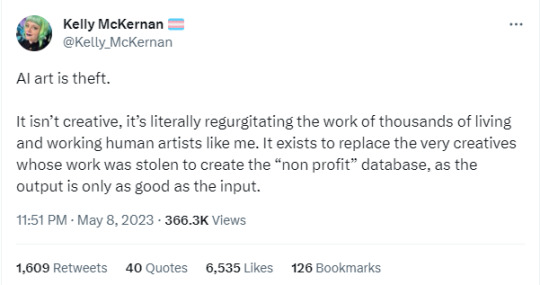
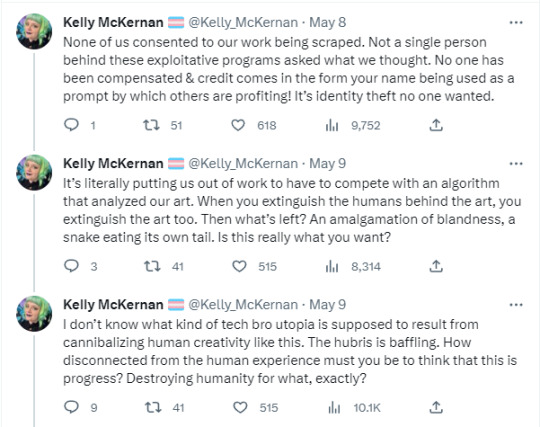
youtube
or this video if you are feeling lazy and only want the art-side opening statements:
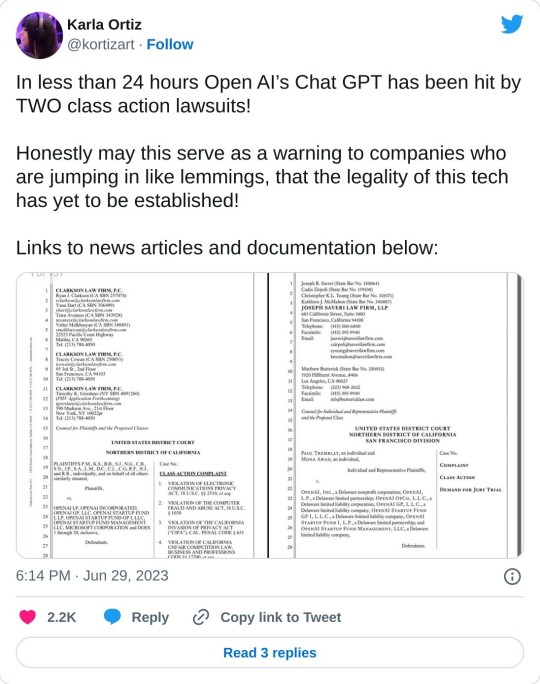
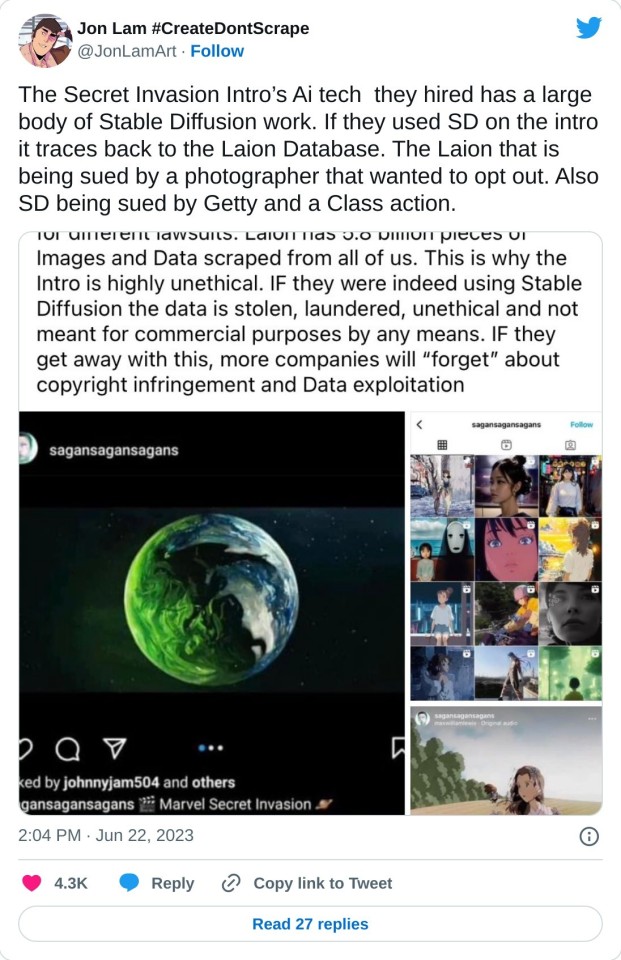
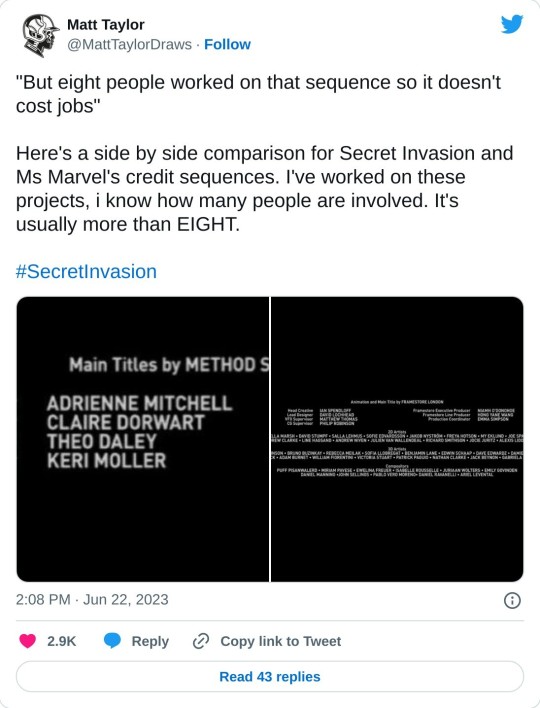
Everytime you feed someone's work- their art, their writing, their likeness- into Midjourney or Dall-E or Chat GPT you are feeding this monster.
Go forth and educate yourself.
#ai art#asks answered#qwillechatter#for real though guys please dont interact with me about AI#I intended for this to be the last post I'll ever make about it#but tumblr ate it so you miss out on the nice essay#all the sources tell you everything you need to know#Im so fucking tired
818 notes
·
View notes
Text
one thing about Online is that the boundary between public and private gets blurred even more than it already is in the real world and, just like In Real, spaces that are private by 'common sense' will have that privacy revoked in order to litigate something as public indecency by an undesirable. fucking dr seuss situation. is it private in a bag? is it private if it's tagged? is it private if you warn? if it's a doxx by kiwifarms?
82 notes
·
View notes
Text
Comment in the Standard: How dare Montecito millionaire Prince Harry demand our tax money to cover his legal costs
This subject matter cannot be covered too much for my taste.

Emphasis and comments by me:
Prince Harry’s latest court defeat in his rightly unsuccessful bid to overturn the decision to refuse him guaranteed Met police protection after he pulled out of royal duties might seem like a trivial battle over legal fees.
But in fact the duke’s failed attempt to pass 50 to 60 per cent of the costs incurred by the Home Office in fighting his unmerited claim tells us much about the preening prince and his selfish disregard for virtually anyone other than himself, his equally self-obsessed wife, Meghan Markle, and his children. [No one else matters of course. It is all about them.]
That’s because when the Duke of Sussex, as he still wants to be called despite ditching his royal role, wasted yet more of the High Court’s time in arguing for the taxpayer to fund at least half of the hundreds of thousands of pounds that the Home Office was forced to spend on the case, what he was really doing was trying to pass on a large chunk of the bill to ordinary taxpayers. [Sponging off others is quite on brand.
That’s right: instead of having the decency to accept that he’d have to pay up when he lost, the Montecito multimillionaire, for whom the legal expenses will be loose change, wanted taxes paid by everyone ranging from people on the minimum wage to bus drivers, cleaners and pensioners to cover his costs. It’s frankly contemptible. [Does he think it is his birthright to have the peasants pay for his temper tantrums?]
It's notable too that yesterday’s costs order by the High Court judge, Sir Peter Lane, reveals that Harry, who is so protective of his own privacy (when it suits him), managed to breach a confidentiality agreement made as part of the litigation by emailing “certain information” that was meant to be secret to one his lawyers and the MP Johnny Mercer. The prince might have apologised for the error, but the costs order refers to the “seriousness of the breach” and it was at best a sloppy mistake that added to the Home Office costs that he was trying to avoid. [What were you up to Harold?]
Harry’s whole case was, of course, misconceived from the start and it’s worth recapping why.
He asserted that the decision in 2020 by security experts on the Government’s Executive Committee for the Protection of Royalty and Public Figures, known as Ravec, that he should no longer receive publicly-funded police protection in Britain because of his move abroad should be overturned.
The supposed reasons were that the committee had allegedly failed to take into account the impact of a successful attack on the prince and had also acted unreasonably, unfairly and with a lack of transparency.
It was nonsense for the prince to think that he knew better than a panel of experts informed by the latest security advice from the police and intelligence agencies. [This man has a very high opinion of himself.] The High Court unsurprisingly dismissed Harry’s claim on all grounds, finding that there was no reason to overturn the Ravec panel’s decision. It had in fact left open the possibility of occasional police protection for the prince when in Britain, if there was evidence in future of a sufficient threat to his safety.
An attempt by the prince to persuade the courts that a later offer by him to pay for police protection should have been accepted was also rebuffed. Yet another judge dragged into Harry’s interminable litigation ruled it would be wrong to allow the wealthy to receive a service from the limited pool of specialist Met protection officers that a less affluent person could not afford.
That too was the correct and inevitable decision. Police protection officers are highly skilled specialists, trained at significant public expense, who exist only in restricted numbers and who are required to safeguard those facing the highest risks such as working royals, Cabinet ministers and prime ministers current and former, not others like Harry wanting the comfort blanket of protection they don’t need.
In short, every argument put forward by Harry was flawed and rejected by the courts. It’s a sign of his delusion that even the succession of earlier rebuffs from the judiciary didn’t stop him basing his attempt to get off a big chunk of the Home Office’s costs in fighting the litigation on the fantasy claim that he’d achieved “partial success” in his legal action. [He learns nothing from his experiences.]
Maybe that was how Harry viewed it. After he all, he told the world in his biography Spare that “there's just as much truth in what I remember and how I remember it as there is in so-called objective facts”.
But it simply wasn’t true, as yesterday’s High Court costs order reminded him.
It pointed out that Harry had “comprehensively lost” and that there was “no merit” in his claim of partial victory with his judicial review argument failing “on all of the pleaded grounds.” [Harold is a big loser.]
It was the obvious outcome from the start and the claim should never have been brought. His inevitable defeat was deserved and now it’s time for the penny-pinching prince to pay up.
👉 How dare Montecito millionaire Prince Harry demand our tax money to cover his legal costs | Evening Standard (archive.ph)
post link
author: Von_und_zu_
submitted: April 17, 2024 at 10:53AM via SaintMeghanMarkle on Reddit
disclaimer: all views + opinions expressed by the author of this post, as well as any comments and reblogs, are solely the author's own; they do not necessarily reflect the views of the administrator of this Tumblr blog. For entertainment only.
#SaintMeghanMarkle#harry and meghan#meghan markle#prince harry#fucking grifters#Worldwide Privacy Tour#Instagram loving bitch wife#Backgrid#voetsek meghan#walmart wallis#markled#archewell#archewell foundation#megxit#duke and duchess of sussex#duke of sussex#duchess of sussex#doria ragland#rent a royal#sentebale#clevr blends#lemonada media#archetypes with meghan#invictus#invictus games#Sussex#WAAAGH#american riviera orchard#top post
78 notes
·
View notes
Text
By Jessica Corbett
Common Dreams
Sept. 26, 2023
Open internet advocates across the United States celebrated on Tuesday as Federal Communications Commission Chair Jessica Rosenworcel announced her highly anticipated proposal to reestablish FCC oversight of broadband and restore net neutrality rules.
"We thank the FCC for moving swiftly to begin the process of reinstating net neutrality regulations," said ACLU senior policy counsel Jenna Leventoff. "The internet is our nation's primary marketplace of ideas—and it's critical that access to that marketplace is not controlled by the profit-seeking whims of powerful telecommunications giants."
Rosenworcel—appointed to lead the commission by President Joe Biden—discussed the history of net neutrality and her new plan to treat broadband as a public utility in a speech at the National Press Club in Washington, D.C., which came on the heels of the U.S. Senate's recent confirmation of Anna Gomez to a long-vacant FCC seat.
Back in 2005, "the agency made clear that when it came to net neutrality, consumers should expect that their broadband providers would not block, throttle, or engage in paid prioritization of lawful internet traffic," she recalled. "In other words, your broadband provider had no business cutting off access to websites, slowing down internet services, and censoring online speech."
"Giant corporations and their lobbyists... will try every trick to block or delay the agency from restoring net neutrality."
After a decade of policymaking and litigation, net neutrality rules were finalized in 2015. However, a few years later—under former FCC Chair Ajit Pai, an appointee of ex-President Donald Trump—the commission caved to industry pressure and repealed them.
"The public backlash was overwhelming. People lit up our phone lines, clogged our email inboxes, and jammed our online comment system to express their disapproval," noted Rosenworcel, who was a commissioner at the time and opposed the repeal. "So today we begin a process to make this right."
The chair is proposing to reclassify broadband under Title II of the Communications Act, which "is the part of the law that gives the FCC clear authority to serve as a watchdog over the communications marketplace and look out for the public interest," she explained. "Title II took on special importance in the net neutrality debate because the courts have ruled that the FCC has clear authority to enforce open internet policies if broadband internet is classified as a Title II service."
"On issue after issue, reclassifying broadband as a Title II service would help the FCC serve the public interest more efficiently and effectively," she pointed out, detailing how it relates to public safety, national security, cybersecurity, network resilience and reliability, privacy, broadband deployment, and robotexts.
Rosenworcel intends to release the full text of the proposal on Thursday and hold a vote regarding whether to kick off rulemaking on October 19. While Brendan Carr, one of the two Republican commissioners, signaled his opposition to the Title II approach on Tuesday, Gomez's confirmation earlier this month gives Democrats a 3-2 majority at the FCC.
"Giant corporations and their lobbyists blocked President Biden from filling the final FCC seat for more than two years, and they will try every trick to block or delay the agency from restoring net neutrality now," Demand Progress communications director Maria Langholz warned Tuesday. "The commission must remain resolute and fully restore free and open internet protections to ensure broadband service providers like Comcast and Verizon treat all content equally."
"Americans' internet experience should not be at the whims of corporate executives whose primary concerns are the pockets of their stakeholders and the corporations' bottom line," she added, also applauding the chair.
Free Press co-CEO Jessica J. González similarly praised Rosenworcel and stressed that "without Title II, broadband users are left vulnerable to discrimination, content throttling, dwindling competition, extortionate and monopolistic prices, billing fraud, and other shady behavior."
"As this proceeding gets under way, we will hear all manner of lies from the lobbyists and lawyers representing big phone and cable companies," she predicted. "They'll say anything and everything to avoid being held accountable. But broadband providers and their spin doctors are deeply out of touch with people across the political spectrum, who are fed up with high prices and unreliable services. These people demand a referee on the field to call fouls and issue penalties when broadband companies are being unfair."
Like Rosenworcel, in her Tuesday speech, González also highlighted that "one thing we learned from the Covid-19 pandemic is that broadband is essential infrastructure—it enables us to access education, employment, healthcare, and more."
That "more" includes civic engagement, as leaders at Common Cause noted Tuesday. Ishan Mehta, who directs the group's Media and Democracy Program, said that "the internet has fundamentally changed how people are civically engaged and is critical to participating in society today. It is the primary communications platform, a virtual public square, and has been a powerful organizing tool, allowing social justice movements to gain momentum and widespread support."
After the Trump-era repeal, Mehta explained, "we saw broadband providers throttle popular video streaming services, degrade video quality, forcing customers to pay higher prices for improved quality, offer service plans that favor their own services over competitors, and make hollow, voluntary, and unenforceable promises not to disconnect their customers during the pandemic."
Given how broadband providers have behaved, Michael Copps, a Common Cause special adviser and former FCC commissioner, said that "to allow a handful of monopoly-aspiring gatekeepers to control access to the internet is a direct threat to our democracy."
Rosenworcel's speech came a day after U.S. Sens. Ed Markey (D-Mass.) and Ron Wyden (D-Ore.) led over two dozen of their colleagues in sending a letter calling for the restoration of net neutrality protections. The pair said in a statement Tuesday that "broadband is not a luxury. It is an essential utility and it is imperative that the FCC's authority reflects the necessary nature of the internet in Americans' lives today."
"We need net neutrality so that small businesses are not shoved into online slow lanes, so that powerful social media companies cannot stifle competition, and so that users can always freely speak their minds on social media and advocate for the issues that are most important to them," they said. "We applaud Chairwoman Rosenworcel for her leadership and look forward to working with the FCC to ensure a just broadband future for everyone."
153 notes
·
View notes
Text
Hey everyone. Have you used Facebook in the United States between May 24, 2007 and December 22, 2022? You can either get money from a Class Action Settlement and not be allowed to be part of any future legal action against Facebook, deny being part of the settlement and retain your future rights to sue, or DO NOTHING and receive NO MONEY while simultaneously GIVING UP YOUR RIGHTS to sue in the future!
They are counting on most people doing nothing, thereby giving up their rights to sue. If you don't care about maintaining those rights, at least get some money for it.
"Unless you opt out of the settlement, you are automatically part of the Settlement. If you do nothing, you will not get a payment from this Settlement and you will give up the right to sue, continue to sue, or be part of another lawsuit against the Defendant related to the legal claims or factual allegations resolved by this Settlement."
246 notes
·
View notes
Text
ANOTHER TRILLION DOLLAR CASE:? TikTok Hit in MASSIVE CIPA Suit Over Its Business Model of Profiting from Advertising by Collecting and Monetizing User Data
ANOTHER TRILLION DOLLAR CASE:? TikTok Hit in MASSIVE CIPA Suit Over Its Business Model of Profiting from Advertising by Collecting and Monetizing User Data
Data privacy lawsuits are EXPLODING and one of our country’s most popular mobile app — TikTok’s privacy issues keep piling up.
Following its recent $92 million class-action data privacy settlement for its alleged violation of Illinois Biometric Information Privacy Act (BIPA), TikTok is now facing a CIPA and Federal Wire Tap class action for collecting users’ data via its in-app browser without…

View On WordPress
#business#CIPA#Cybersecurity#data collection#data privacy#Internet#legal#Litigation#media#Social Media#TCPA#telecom#TikTok
2 notes
·
View notes
Text
Soul Mates: Part One
Pairing: Spencer Reid x Female!Reader
Word Count: ~1.8k
Summary: A man is accused of rape and kidnapping in another state, so he moved across the country to get away from those allegations. Now, the same thing is happening but this time, it might very well be true.
Warnings: canon violence, canon language, canon talk of death, methods of kill
Author’s Note: I do not own anything from Criminal Minds. All credit goes to their respective owners. If there are any warnings that exceed the normal death/kills from the show, I will list them. If you’ve seen the show, then it’s the same level of angst unless otherwise stated

x
"No mortal can keep a secret. If his lips are silent, he chatters with his fingertips; betrayal oozes out of him at every pore." - Sigmund Freud
Missy Dewald is missing, there are already three dead women in Florida, and everyone in Florida seems to think that William Harris is the man who kidnapped Missy. For the past week, they've been conversing with Hotch for some advice on what they should do. Hotch kept telling them to wait and make sure William is the one they want, but they are so convinced this is the man that they need.
William has a history of kidnapping and raping young women in Atlanta. There have been charges against him, but the victims refused to testify against him, so the charges were dropped. He and his family moved from Atlanta to Florida to start new, but some theorized it was to escape that stigma.
By the time you get to Florida, William is already in handcuffs and is taken into custody. The first impression you get from the brief look of William is that he's arrogant, cocky, and confident that he is going to make it out of this just fine.
Hotch is pissed the police didn't wait to bring William in, but it is what it is. Detective Jeff Lindin really thought that William was holding Missy somewhere on his property, but when they arrested him, she was nowhere to be found. Jeff greets your team when you arrive, but you're keeping your eye on William.
"All week, you've been saying he needs privacy and time. You told me he wouldn't keep her on his property, but I wouldn't listen," Jeff sighs.
"Detective, we have a witness who can place him at the abduction site. He has a history of similar offenses where he did use the same MO in Atlanta," Derek says.
"He fits the profile of a high-functioning successful family man living and working in the area. You had probable cause to make the arrest. We just don't have enough to prosecute him yet."
"What's our next move?" Jeff asks.
"The key to finding her could be in his house, so we're gonna need to dig through all there is about his friends, family, and his work life. Agent Morgan and I will interrogate him," Rossi says.
"He holds his victims for two days before he kills them. Missy disappeared yesterday. So, as long as he stays in custody, there's a good chance she could still be alive. Talk to the detective that arrested him for the Atlanta rapes. Find out what went right and what went wrong with their approach," Hotch says to Jeff.
"Williams is a successful litigator, so we're gonna need some leverage, something to throw him off guard. A discrepancy in a previous statement is enough to give us the upper hand. Y/N read anything off him that you can."
"Sure thing."
"I'll get on that," Jeff says. "Now, we can only hold him for so long after he talks to the judge. What are the odds we can get him to break in the next twelve hours?"
"That's not going to be easy, but it's not impossible."
Rossi and Derek head to the interrogation room, and you follow behind them without actually going inside the room. You can read William from the window just fine.
"William Harris, I'm Special Agent Derek Morgan. This is special agent David Rossi."
"Before you answer any questions, I need to remind you that you're entitled to have a lawyer present," Rossi says.
"I am a lawyer."
With that, Derek takes out some pictures in the file he's holding. He lays the first one on the table, and it's of one of the missing girls.
"Does she look familiar to you?" Without waiting for his answer, Derek lays out the other two pictures of the dead women. "How about her? Her? No? These girls were raped, strangled, and dumped."
"My god. I have a daughter their age."
"Missy Dewald went missing yesterday."
"What do you think you have on me?"
"We have a witness who can place you at the mall at the same time as her abduction. Rumor has it that you seem to have a history of this type of behavior."
"How is that?"
"Tell us about Atlanta."
"Atlanta? Those charges were dropped. It was a mistake."
Will is acting like this isn't a big deal. If he continues with this cocky streak, he is going to give something away that will incarcerate him for the rest of his life.
"Because the two rape victims wouldn't testify, and now you cover your tracks by killing them."
"I didn't do this."
"You've been married, what, eighteen years? Do you remember that feeling you get when you fall in love? You miss that feeling, don't you? Being married to the same woman is like ordering the same entree for eighteen years."
"Agent Rossi, every minute you spend with me is another minute she's alone with him," Will sighs, clearly bored.
"So, we've brought in the wrong guy?"
"Yes."
"Just like they did in Atlanta?"
"Yes, and by the time you realize I've been telling the truth, this poor girl could be dead."
Derek and Rossi can handle this guy, so you leave and go find your boyfriend who is looking through Will's personal laptop with Penelope on the phone. You have to stop and lean against the wall because Spencer is too gorgeous for you to focus on walking right now. He's been growing out his hair, and this morning, he slicked it back with a bit of gel. He always looks good, but this is a sexy look for him.
When he sees you, he waves you over with a smile. You bite your lower lip in thought as you walk over to him. You lean down and kiss his cheek while he works.
"Did you two find anything?" you ask knowing Pen is on speakerphone.
"Give me a minute. I will find the grime."
"So far, William Harris appears to be quite intelligent. He's covering his tracks pretty well," Spencer says to you.
"Yeah, just because you delete your history, doesn't mean all your dirty cyber laundry isn't hanging out there for me to find on your hard drive. Rookie mistake."
While Penelope is searching through his hard drive, Will is granted a bail hearing. He is taken to court to see how much bail would be, and it's a whopping five million dollars. His wife and only daughter can't pay for that, but you know he'll try and manipulate his way into getting her to pay it. You kind of feel bad for Sharon and Angela, who are his wife and daughter respectfully, because they had to deal with this in Atlanta. They moved to Florida to get away from all of this, and now they have to deal with it all over again.
On the other hand, Penelope found something interesting on Will's hard drive, and you think everyone else will find it just as interesting. Rossi, Derek, and Jeff gather around to hear what you and Spencer have found with Penelope.
"Garcia's been digging through William's computer. She found an encrypted link to a web page. It took us to an unsearchable, untraceable blog with tons of journal entries. It's like some sort of diary."
"Did you find anything incriminating?"
"I was able to differentiate between two distinct voices of two authors. I found various idiosyncratic words, phrases, punctuation, and orthography within the blog entries consistent with each separate person. Words like 'soda' and 'pop'. One guy uses dashes while the other uses ellipses," Spencer giggles.
You can't help but giggle along with him because he's so cute when he gets like this. Rossi, Derek, and Jeff just stand there and stare at you two, and you look away with a blush.
"One side of the discourse made a reference to the devil's strip," you say, changing topics.
"What the hell is that?" Jeff asks.
"It's a small patch of grass that separates the sidewalk from the street. That term is only used in Central Ohio. William lived in Atlanta for twenty years, but he grew up in Columbus. The other guy uses words like 'turnpike' and 'filling the gas tank', which are both specific regionalisms for Florida."
Will comes back from the court in handcuffs, and Derek looks over at him with concern.
"Kid, are you sure about this?" Both you and Spencer give Derek a bitch face, and he nods in understanding. "Right."
"Keep it up, baby," you grin and kiss Spencer's cheek.
You follow Rossi and Derek back to the interrogation room, but you stay outside the room. Rossi gathered some of the papers Spencer grabbed from the journal entries.
"Was there a new development?"
"I can't remember the last time I smiled for so long that it hurt. I've never felt like this before," Rossi reads from the papers. "It sounds like you're bored at home. Are you having an affair?"
Will keeps his composure when he hears Rossi read some of his private entries, but you can tell it bothers him. He's keeping a cool composure because he believes that whatever he did won't come back to him.
"I told you, I'm happily married."
"Does your wife know about your secret diary? I bet she'd like to know how good you are at keeping secrets."
"I'm not sure what you think you've found, but you've gone from completely wrong to completely insane."
"You're hiding something, William," Derek glares.
"No jury will convict me because somebody saw me at the mall, and you think I'm talking with someone other than my wife," William scoffs.
Jeff comes storming through the room you're in and into the interrogation room with a purpose. William looks at him with the same cocky expression on his face.
"We found Missy."
"Told you so," Will smirks.
"You son of a bitch!" Jeff goes to attack Will, but Rossi and Derek effectively hold him back. "Damn you!"
If Missy is found dead, then you'll have better luck getting something off her than you will with William. Rossi and Derek stay behind with Will while you, Hotch, Jeff, and Emily head out to the dump site where Missy still is. It's a good thing they didn't move her because sometimes, that tampers with the evidence lingering behind.
"That's her. That's Missy. I looked her father in the eye and swore I'd find her alive," Jeff says painfully.
"So, since we've been here, this girl's gone missing and now turned up dead. Do you think he dumped the body before he was picked up?" Emily asks.
"The ME estimates she was killed several hours ago."
"But we've had William in custody. Do you think we have the wrong guy?"
You slap on some gloves and kneel down next to Missy. You move the hair away from her face and lay a hand flat on the skin below her neck. Images of her final moments on Earth flash before your eyes, and you try to concentrate on one image at a time.
William isn't in any of them, but a scrawny white man with glasses is. He's all over Missy, trapping her and pinning her down to the table. She has a look of pain on her face as he bites her, and that's evident by the bite marks you notice on her collarbone.
Traces of Will's energy can be found on Missy, but it's mostly that of the white man.
"We don't have the wrong guy, but he has a partner." You stand up. "Will's confident that this partner won't turn against him, and he's doing everything he can to get Will out of jail."

x
Follow my library blog @aqueenslibrary where I reblog all my stories, so you can put notifications on there without the extra stuff :)
#criminal minds#criminal minds fanfic#criminal minds fic#criminal minds fan fiction#criminal minds fan fic#criminal minds fanfiction#criminal minds fluff#criminal minds angst#criminal minds series rewrite#series rewrite#cm season 4#spencer reid#spencer reid fanfic#spencer reid fan fic#spencer reid fan fiction#spencer reid fanfiction#spencer reid fic#spencer reid fluff#spencer reid angst#spencer reid x reader
41 notes
·
View notes
Text
Abortion politics is threatening to roil Florida Republicans’ chances in competitive state Legislature races amid widespread voter backlash.
The Florida Supreme Court upheld a 15-week limit on abortion earlier this month, paving the way for a six-week ban passed by the state Legislature last year to soon go into effect.
Now, a handful of vulnerable Republican state lawmakers who supported the six-week restrictions could be imperiled in November as anger over the ban grows.
“Given how unpopular this new policy is and the fact that there’s a constitutional amendment question regarding abortion on the ballot, I do think that there’s some risk for down-ballot Republicans,” former Rep. Carlos Curbelo (R-Fla.) told The Hill.
Florida has become a focal point in the battle over abortion access as a number of states have seen abortion access curtailed following the overturning of Roe v. Wade.
The state Supreme Court ruled earlier this month that the contested 15-week abortion restriction could proceed, arguing that a privacy clause within the state Constitution does not pertain to abortion.
The state Legislature last year passed a six-week limit on the medical procedure, though it was not enforced as the litigation around the 15-week ban wound its way through the courts.
The six-week ban will officially become enacted May 1, rapidly changing the landscape of abortion access in the Sunshine State. At the same time, abortion-rights advocates eked out a win this month when the Florida Supreme Court said a ballot measure seeking to enshrine abortion protections into the state Constitution could go before voters this fall.
Among the members who voted for the six-week ban who live in swing districts are GOP state Reps. Rachel Saunders Plakon in Seminole County; Susan Plasencia, who represents parts of Orange and Seminole counties; David Smith in Seminole County; and Carolina Amesty, who represents portions of Orange and Osceola counties. Not all of them currently have declared Democratic challengers.
Nonetheless, Democrats are confident some of these GOP state legislators will be vulnerable for voting on the six-week ban. If that’s the case, it would show how abortion politics is roiling redder states at a more local level.
“I do think for all these Republicans that voted essentially with [Gov. Ron] DeSantis in an attempt to boost his ambitions for the White House — they haven’t only endangered women and abortion seekers, but they’ve also endangered their political careers, and it will be made very clear on the campaign trail how out of touch they are, even with their own base,” said state Rep. Anna Eskamani (D), who previously worked at Planned Parenthood.
Yet some experts like Michael Binder, faculty director of the University of North Florida’s Public Opinion Research Laboratory, are skeptical that vulnerable GOP state lawmakers could be in further trouble over their vote on the six-week abortion ban alone.
Binder noted “there is a ballot measure that is out there that expands and enshrines abortion rights into the state constitution, and that is certainly something where you could see some folks maybe voting for a Republican but also voting ‘yes.’”
“It could also maybe motivate a few more people to come out that might otherwise not come out,” he added. “Not a lot, but a few.”
Some Republicans also say they are skeptical, noting factors like candidate quality and other top issues among voters.
“Overall, having the six-week abortion ban, reproductive rights amendment on the ballot is a net plus in terms of Democratic voter turnout,” said Justin Sayfie, a Florida-based Republican strategist. “But the challenge for the Democratic Party in Florida in these state House and state Senate races is putting up viable candidates.”
Florida Democrats say they are up for that challenge, announcing a recruitment effort earlier this month to bring in candidates for every state and federal legislative office.
But Republicans say the issue also stems from the two candidates who will be at the top of the ballot in Florida this cycle: President Biden and former Rep. Debbie Mucarsel-Powell (D-Fla.), a Senate candidate.
“They’ve got two weak candidates [on the statewide ballot]. They need something else to energize their voters,” Sayfie said.
Biden and Mucarsel-Powell have both zeroed in on abortion as a key campaign issue in the state. Earlier this week, the president made a campaign stop in Tampa, taking the opportunity to slam Florida’s six-week abortion ban, which is slated to go into effect next week. Meanwhile, Vice President Harris is slated to deliver remarks in Jacksonville the day the ban takes effect.
“It’s not so much that we have to make it an issue, that people have already made this an issue,” said Florida state House Minority Leader Fentrice Driskell (D). “Voters have shown us that this is the formula to connect with them, to be able to have the credibility to ask for their vote, you have to be able to say that you authentically say that you care about the issues that they care about.”
Polling shows the issue is certainly on voters’ minds.
An Emerson College polling survey released earlier this month found that 42% of Florida voters said they plan to vote in November in favor of the amendment to enshrine abortion rights into the state’s constitution, while 32% said they were not sure. 25% said they would vote against the measure.
A separate USA Today/Ipsos poll from earlier this month found that 57% of voters said they would vote to expand abortion access through the ballot measure.
Still, Republicans say other issues will be at play in November, particularly for swing voters.
“That’s the danger for Democrats, they talk so much about abortion and reproductive rights that voters think, ‘Gosh, they don’t care about these other issues that I care about,’” Sayfie said.
#us politics#news#the hill#2024#republicans#conservatives#gop#Florida Supreme Court#Rep. Carlos Curbelo#abortions#abortion bans#reproductive justice#reproductive health#reproductive rights#rep. Rachel Saunders Plakon#rep. Susan Plasencia#rep. David Smith#rep. Carolina Amesty#Rep. Anna Eskamani#Michael Binder#Justin Sayfie#Debbie Mucarsel-Powell#president joe biden#rep. Fentrice Driskell#polls#florida#Florida house of representatives
7 notes
·
View notes
Text
"These cases one day are going to come and kick him in the face." He thinks he's on a mission and people on missions invariably get embarrassed & burnt.---Tom Bower
Enlightening conversation between Tom Bower & Dan Wootton about Harry, the "publicity addict," and his entirely unnecessary attendance at the London preliminary hearing.
Tumblr has said (in one way or another) that Harry is playing a role. He's just too ignorant to understand that his role is that of the useful idiot, the tool, the puppet.
Harry's position in England is quite bizarre. This case is messy which is the reason royal family members shouldn't be involved.
King Charles should stand well away from Harry, a controversial, litigation happy <darling> son. Harry is dangerous.
Harry was enticed to believe that he was lied to about staying out of litigious fights. Harry believes that it was a conspiracy that royals could NOT get involved in such cases, but he doesn't understand that it was in fact a good rule.
He's involved himself in a rotton bean feast. The statement by private investigator, Gavin Borrowers, reveals that he was NOT involved.
Harry has surrounded himself by trigger happy lawyers and craven celebrities who have put ideas in his mind about changing the world when in fact, Harry will come out looking quite stupid.
Harry doesn't believe in a free press. How dare the mail accuse him of spin! He believes the press should be obedient to him. He's digging deeper in the mud, into debt.
Harry is surrounded by a group of people who want to control the freedom of the press, all very sinister. Take lawyer David Sherburne, a hater of the media and absolutely determined to destroy the free press. They employ highly paid PR firms to ensure that only stories that glorify them appear in the press, no criticism.
This type of litigation is deeply miserable, traumatic and dominates your life and yet Harry is pursuing these terrible legal cases. It paints a picture of a man who is deeply unhappy & deeply unwell.
Harry reveals more details & Private revelations in Spare <us> than any tabloid reporter has ever revealed. Including invading the privacy of his family & his friends. The guy is deluded. When his friends complain, Harry cuts them off.
"Harry isn't intelligent enough to realize the contradictions and the hypocrisy but he's gonna get burnt."---Tom Bower
youtube
The Behavior Panel Called It- SJW

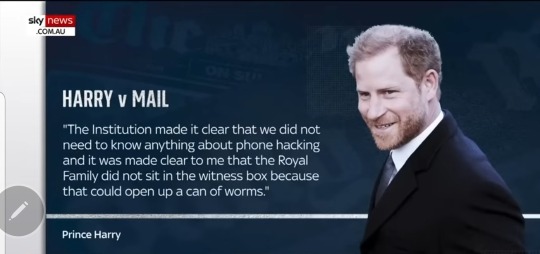
54 notes
·
View notes
Text
Following FTC User Privacy Settlement, Private Litigant Goes After Twitter
Following FTC User Privacy Settlement, Private Litigant Goes After Twitter
Dovetailing on a $150 million fine imposed by the Federal Trade Commission (FTC) last week, a Twitter user has sued the company for the same alleged conduct: using her telephone number and email for advertising purposes under the pretext that it was for security functions like two-factor authentication.
Tuesday’s complaint argues that Twitter failed to adhere to its own privacy policy, which…

View On WordPress
0 notes
Text
Over 100 artists including Rage Against the Machine co-founders Tom Morello and Zack de la Rocha, along with Boots Riley and Speedy Ortiz, have announced that they are boycotting any concert venue that uses facial recognition technology, citing concerns that the tech infringes on privacy and increases discrimination.
The boycott, organized by the digital rights advocacy group Fight for the Future, calls for the ban of face-scanning technology at all live events. Several smaller independent concert venues across the country, including the House of Yes in Brooklyn, the Lyric Hyperion in Los Angeles, and Black Cat in D.C., also pledged to not use facial recognition tech for their shows. Other artists who said they would boycott include Anti-Flag, Wheatus, Downtown Boys, and over 80 additional artists. The full list of signatories is available here.
“Surveillance tech companies are pitching biometric data tools as ‘innovative’ and helpful for increasing efficiency and security. Not only is this false, it’s morally corrupt,” Leila Nashashibi, campaigner at Fight for the Future, said in a statement. “For starters, this technology is so inaccurate that it actually creates more harm and problems than it solves, through misidentification and other technical faultiness. Even scarier, though, is a world in which all facial recognition technology works 100% perfectly – in other words, a world in which privacy is nonexistent, where we’re identified, watched, and surveilled everywhere we go.”
Facial recognition technology at venues has grown increasingly controversial over the past several months, particularly as Madison Square Garden Entertainment and James Dolan have garnered scrutiny for using the tech to kick out lawyers affiliated with ongoing lawsuits against the company. Several attorneys had been removed last year from events at MSG’s venues including its eponymous arena and Radio City Music Hall. Last October, attorney Barbara Hart was removed from Brandi Carlile’s Madison Square Garden Concert because her law firm was litigating against MSG in a class action lawsuit. (Hart herself wasn’t involved with that suit.)
#Boycotting Venues That Use Face-Scanning Technology#article#rolling stone#surveillance#Facial recognition
33 notes
·
View notes